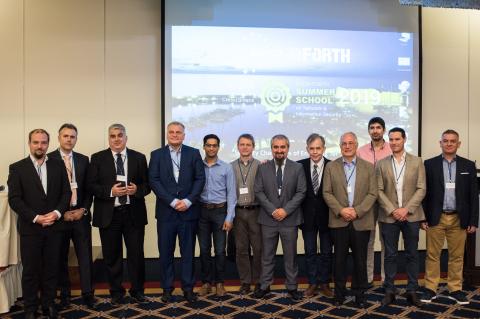The European Union Agency for Cybersecurity (ENISA) and the Institute of Computer Science of the Foundation for Research and Technology - Hellas (FORTH) jointly organised the 6th Network and Information Security (NIS) Summer School from 16- 20 September 2019 in Heraklion, Greece.
The theme of the Summer School for this year was "Security Challenges of Emerging Technologies", referring to the security challenges and opportunities posed by new technologies such as Artificial Intelligence, new Network Infrastructures (i.e. 5G), IoT applications, Machine Learning, etc.
The week-long Summer School began with the policy perspective that gave a state of play of cybersecurity in Europe, the challenges and opportunities. Speakers included Prof. Dr. Udo Helmbrecht, Prof. Dr. Nektarios Tavernarakis, Mr. Antonis Tzortzakakis, Ms. Despina Spanou and Mr. Peter Kouroumbashev.
“It is a great pleasure to collaborate with FORTH to organise the 6th Network and Information Security (NIS) Summer School in the context of fostering cybersecurity expertise, strengthening training and sharing of best practices among the research community, policy makers and industry. The Summer School provides participants with the opportunity to discuss and exchange ideas about the biggest technological challenges in cybersecurity in the coming years. ENISA is also proud to celebrate the Memorandum of Understanding that was signed with FORTH a year ago and looks forward to continuing its fruitful co-operation,” stated ENISA’s Executive Director, Udo Helmbrecht.
"We are proud to participate in the organisation of the 6th Network and Information Security (NIS) Summer School, and to celebrate the Memorandum of Understanding that both Institutions have signed. The Foundation for Research and Technology places special emphasis on the field of Network and Information Security. NIS summer school provides an ample opportunity for scientific interactions and successful collaborations between ENISA and FORTH, as it directly impinges on multiple facets of their research activities.” stated Nektarios Tavernarakis, Chairman of the Board of Directors of FORTH.
The conference had specialised break-out sessions in the following four areas; Cyber Threat Intelligence (CTI), Incident Management, Cyber Defence and Cryptography. These break-out sessions allowed participants to gain a deeper knowledge of specific areas of expertise while also partaking in exercises to develop hands-on practical skills.
Research shows that there is a vast number of incidents that take place in Europe as globally, so the question is not “if” but “when”. The Summer School hopes to build a high-standard cybersecurity knowledge for the challenges ahead and support technical capabilities to analyse threats and manage incidents.
Key Outcomes from Trainings
- Cooperation and information sharing are key to improving cybersecurity, therefore the collaboration between the training teams is seeing as part of the hands-on experience.
- There was an excellent exchange of knowledge amongst participants with different backgrounds, from cyber defence to incident management and threat intelligence.
- The event combined lectures, exercises with team building, which provided attendees with a good balance of theory and practice. The time pressure that participants underwent in the scenarios simulated a real-life response.
- Attendees learned how to better support the planning process with actionable intelligence.
- The event encourages networking amongst academic, public sector and private sector attendees and speakers
Background Information
ENISA and FORTH through the Summer School, bring together a distinguished faculty from around the world with the purpose to identify current trends, threats and opportunities against the background of recent advances on NIS measures and policies. Recognising the multi-dimensional facets and intricacies causing changes in the information risks landscape, an array of lectures will cover a variety of key aspects on policy, economic, legal and research matters. By going through a natural evolution cycle, but also by adopting current trends in networking and exchange of knowledge, this year’s Summer School aimed at increasing interaction among participants via targeted breakout sessions and trainings, which will enhance dialogue and exchange of ideas.
The audience included policy makers from EU Member States and EU Institutions, decision makers from industry and members of the academic community.
Event website
https://nis-summer-school.enisa.europa.eu/#intro
For further information, please contact press at [email protected]

